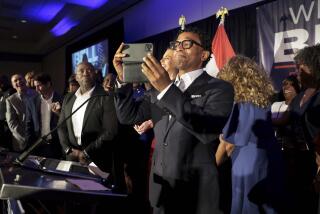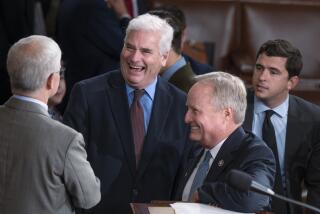Many GOP Candidates Seek to Distance Themselves From Bush : With the President’s popularity at an all-time low, there is concern that he could drag other party members down to defeat.
- Share via
ST. JOSEPH, Mo. — Back in his congressional office in Washington, Rep. Thomas E. Coleman (R-Mo.) is unmistakably a George Bush Republican.
Over the past few years, the 49-year-old lawmaker has backed Bush’s position on legislation 77% of the time. He was state co-chairman of Bush’s campaign in 1988. And his office walls are covered with photos of himself and his wife, Marilyn, with George and Barbara Bush.
“I’ve been a real supporter of the President,” the congressman said.
But here in his district, Coleman has barely acknowledged that he is running on the same ticket as Bush. There are no “Bush-Coleman” campaign posters. Photos of the Bushes and Colemans together are nowhere to be seen. And local residents say that as Coleman seeks his ninth term, he avoids even mentioning Bush unless he has to.
Coleman isn’t the only Republican feeling uneasy about being linked with the President. With Bush’s popularity at an all-time low, GOP candidates increasingly are concerned that if his ratings don’t improve soon, Bush could drag them down in November as well.
Just a few days ago, more than a hundred GOP House members vented their frustration at Frederic V. Malek, Bush’s campaign manager, warning during a meeting in Washington that the reelection effort needs to be “reinvigorated,” and that the President must “talk tougher” or else GOP lawmakers who are in close races could be hurt badly.
“There is no Bush campaign right now,” complained Rep. Bill Green (R-N.Y.). “It’s got to be of concern” to Republicans running for Congress.
A recent poll by Cable News Network and the Gallup organization showed that if the election were held now, the proportion of voters supporting Democratic congressional candidates would outpace those backing Republicans by 11 percentage-points--up from a 5-percentage-point gap in April.
Charles Cook, a Washington-based political consultant, said some Republican candidates are treating Bush as a potential liability. “They’re not actually running away from the President yet, but they’re certainly distancing themselves,” he said.
Rich Williamson, a Chicago-area conservative who is running against Democrat Carol Moseley Braun for the U.S. Senate seat from Illinois, does not even mention in his campaign brochures that he is a Republican. Supporters contend he is trying to avoid alienating moderate Democrats.
And a few days ago, the usually mild-mannered Coleman surprised local politicos by publicly criticizing Bush’s campaign, saying he was “very concerned that George Bush doesn’t have his act together, campaign-wise.”
He also blasted Vice President Dan Quayle as a threat to the GOP ticket. “It wouldn’t be . . . upsetting” Coleman said, “if he (Quayle) were replaced.”
William Schneider, a political analyst with the Republican-leaning American Enterprise Institute, said the attitude among many GOP candidates is beginning to show signs of the same jump-ship mentality that plagued former Democratic President Jimmy Carter during the 1980 election campaign.
All over the country, Schneider says, GOP candidates are becoming “angry and worried” about the impact of the President’s weakness on their campaigns, and are beginning to go their own--separate--ways. “They have reason to be angry,” Schneider said.
Although Schneider noted that a presidential candidate’s standing doesn’t always have a major impact on congressional races, it did in 1952, 1964 and 1980, when landslide victories by Republican Dwight D. Eisenhower, Democrat Lyndon B. Johnson and Republican Ronald Reagan have been credited with influencing many House and Senate races. Analysts say the effect of the 1992 presidential race on congressional elections depends on how several factors sort out as the November vote approaches.
Bush himself is making the link to congressional elections in his own campaign, imploring voters to elect Republicans so that his Administration can get its domestic programs passed. Whether voters who oppose the President will vote to oust Republican lawmakers as well remains to be seen.
Rep. Vic Fazio (D-West Sacramento), chairman of the Democratic Congressional Campaign Committee, said that while it’s too early to say for sure, he sees increasing evidence that “the President’s unpopularity is translating into a weakening of support for Republicans who backed his policies. It’s a combination of guilt by association and guilt on the record.”
What is particularly galling to many Republicans is that, Bush’s weakness aside, this was to have been the year when everything was to have gone the GOP’s way on Election Day. The party, in fact, was looking forward to big gains in congressional races.
The nationwide redrawing of congressional districts--combined with the fallout for Democrats from the House bank scandal--was to have given Republicans a big opportunity to recoup House seats. And Bush seemed almost unbeatable a year ago, with the Democrats on the run.
But now, the possibility that Bush’s steep drop in the polls might deprive Republicans of any big gains in congressional seats is raising hopes among Democratic candidates.
Pat Danner, a Missouri state senator who is Coleman’s opponent in the 6th District congressional race, said that while she doesn’t plan to make a big issue of the Bush-Coleman link, the message will be there just the same.
Still, politicos say there are too many other factors--the impact of redistricting, the anti-incumbent sentiment and residual voter anger over the bank scandal, for example--for analysts to predict any specific gains by either party.
And not everyone is panicking over the President’s weak showing. Bush’s ratings may be at rock-bottom levels now, but most pundits expect his popularity will rebound after the Republican Convention next week, and that the post-nomination surge now being enjoyed by Democratic presidential nominee Bill Clinton will narrow substantially.
In addition, some strategists believe that even if Bush’s popularity remains low, it still may not be a deciding factor in most congressional campaigns, particularly those where local issues and personalities dominate voters’ concerns.
Neil S. Newhouse, a Washington-area pollster and political adviser who is handling Coleman’s campaign, said his client isn’t likely to be hurt by Bush’s low standing. And Coleman himself insisted he isn’t worried about any spillover factor. “I’ve always run ahead of the ticket in this district,” he says.
Even so, in a year in which Republicans and Democrats are battling both a strong anti-incumbent backlash and widespread voter disillusionment with both parties, even the skeptics concede that every little bit makes a difference--and almost anything can spell defeat for a candidate who is not fully prepared.
While contending that it still is “extremely premature” to worry about a possible spillover effect, Linda DiVall, an Alexandria, Va., political consultant who specializes in helping GOP candidates, is urging her clients, as a precautionary measure, to “put together a campaign in which they define themselves” apart from their links to party and President.
To many analysts, the real test of the Bush factor is yet to come. Ed Goeas, president of the Tarrance Group, a GOP-oriented political consulting firm, said the critical point for many GOP congressional candidates will come in mid-September, when Bush will have gone through his own post-convention surge and polling data ought to be more reliable.
“We’ll take another look right after Labor Day--if the President doesn’t come back by then, you’re going to see them (GOP congressional candidates) cut bait,” Goeas predicted.
Washington-based consultant Cook agrees. For now, he said, “it’s very safe to say the President is not going to be an asset” this November. “The question is,” he added, “will he be a liability?”
Wary of White House Ties
GOP candidates are concerned that if the President’s ratings don’t improve soon, he could drag them down in November:
BUSH’S SLIDE IN THE RATINGS
Approve Disapprove Don’t know Aug. ’92 34 60 6 July 41 54 5 March 44 51 5 Feb. 46 47 7 Nov. ’91 53 41 6 Sept. 65 29 6 Aug. 73 23 4 June 74 23 3 April 82 16 2 Jan. 85 12 3 Nov. ’90 61 34 5 Aug. 75 18 7 Dec. ’89 80 13 7 Sept. 66 17 17 July 60 22 18 April 54 17 29 March 61 14 25
Breakdown of Congress
Dem. GOP Ind. Senate 57 43 -- House 268 166 1
Rep. Thomas E. Coleman (R-Mo.), top, is a George Bush Republican but has criticized Bush’s campaign, saying he was “very concerned that George Bush doesn’t have his act together campaign-wise.”
Source: Approval ratings from Los Angeles Times Poll, except August, 1992, which was done by Gallup
More to Read
Get the L.A. Times Politics newsletter
Deeply reported insights into legislation, politics and policy from Sacramento, Washington and beyond. In your inbox twice per week.
You may occasionally receive promotional content from the Los Angeles Times.










